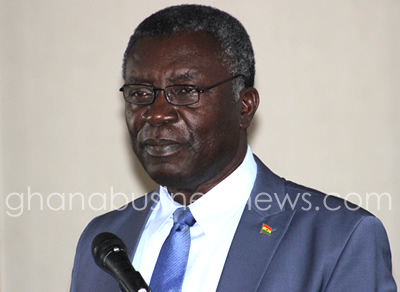Poverty gap is technological – Prof Frimpong-Boateng
 Professor Kwabena Frimpong Boateng, Minister of Science, Technology and Innovation, has said the poverty gap as seen on the continent was due to the lack of the application of technology.
Professor Kwabena Frimpong Boateng, Minister of Science, Technology and Innovation, has said the poverty gap as seen on the continent was due to the lack of the application of technology.
He said leveraging science and technology and mainstreaming research for development has the panacea for reversing this trend.
Prof Boateng said this at the opening of a three-day workshop and annual Grantees Meeting Programme under the Developing Excellence in Leadership Training and Science (DELTAS AFRICA) project.
It was organised by the African Academy of Sciences (AAS) and the Alliance for Accelerating Excellence in Science in Africa (AESA) under the auspices of the West African Centre for Cell Biology of Infectious Pathogens (WACCBIP) of the University of Ghana.
He said a Presidential Advisory Council and a Science and Technology Innovation (STI) fund would be established to notch the needed support for research and development for accelerated growth.
The Minister said government was re-modifying the existing science policy to meet the exigencies of the time.
Prof Boateng said government was resolved to meeting the recommendations of the African Union to commit one percent of its gross domestic product (GDP) to funding science and research, with efforts towards attaining this mandate hovering around 0.025 percent.
He called for attitudinal change, minimising corruption, getting rid of filth and developing the capacity for inventions in machinery as the game changer.
“We need to believe in ourselves that we are eagles and can fly higher and detest being eaten as chicken” Prof Boateng said.
Mr Kingsley Aboagye-Gyedu, Deputy Minister of Health, commended AAS, AESA, DELTAS Africa and partners for their collaboration to mobilise funding for research and development (R&D) for sustainable health outcomes in Africa.
He pledged government’s efforts to creating more ecosystems to support R&D stating that African health researchers should lead in the fight for health for all.
Prof Ebenezer Oduro Owusu, Vice-Chancellor, University of Ghana, said WACCBIP and other related programmes have the potential to reverse the brain-drain syndrome by shifting the centre of gravity for science and technology to thrive.
The 11 DELTAS Africa programme, which has a target of training 1,288 researchers over five years, aims at producing world-class scientific researchers to address African health and quality research priorities and excellence.
Source: GNA
